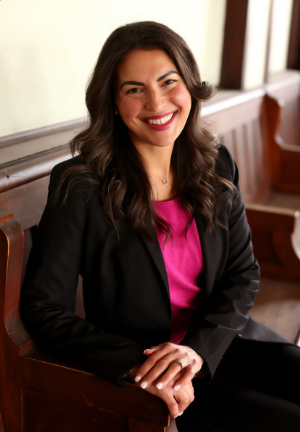· DMACC Adjunct Nursing Instructor Puts in 19-Consecutive 12-Hour Days Battling COVID-19 in New York City.
· As a Nurse, Nicole Nichols Knew She had to Respond, No Matter the Fear or Risk, to Care for Those Suffering from the Pandemic
· Beautiful Card from a Norwalk Girl Touches the Heart of A Nurse On a Day When It Was Really Needed
ANKENY, Iowa—Dr. Nicole Nichols of St. Charles is a nurse and a DMACC Adjunct Nursing Instructor. She is celebrating National Nurses Week, May 6-12, by recovering from a grueling three-week stint in a “hotspot” of the COVID-19 virus in this country. Nichols has been putting in 12-hour shifts at New York City’s Roosevelt Island Medical Center (RIMC) set up in the Coler Rehabilitation Facility.
In less stressful times, Nichols would be teaching clinical rotations at the DMACC Urban, Ankeny or Boone Campus. Now, she’s wrapping up 19 consecutive days of seeing the worst COVID-19 cases in America.
Dr. Nichols became a Licensed Practical Nurse in 2006 and a Registered Nurse in 2007. She received a BSN in 2017, a Master’s in Nursing Education in 2018 and her Educational Doctorate degree in Nursing Education Specialization with a concentration in online curriculum design/development in March of 2020. In addition, she is working on a dissertation on disaster preparedness from nursing student’s perspective.
“I took an oath in 2006 to be a servant to others, to provide care to those in need without hesitation or question,” Nichols said. “The passion to care for others has always been a part of me. When the COVID-19 numbers began to overwhelm the health care system, the fire in my gut ignited. I knew then I needed to respond, no matter the fear or risk. I answered the call because I uphold the oath every day of my life.”
Dr. Nichols said she cares for patients and acts as a charge nurse in a unit that started with nothing and no one, completely bare of supplies and staff.
“The 31-bed unit came together in 16 hours and we haven’t looked back,” Nichols said.
She said he responsibilities include reviewing charts, looking at potential admissions/discharges, reviewing lab results, overseeing staffing needs, and maintaining the flow and morale of the staff and patients.
“Twelve hour shifts are rough,” Nichols said. “It makes no difference if these are your normal shift hours or not. Even the seasoned 12-hour nurses are run down. When I complete by 21-day assignment, I will have worked 19 12-hour shifts back-to-back with no breaks.”
She admits decontamination adds about an another hour to every day once she gets home from a shift.
Dr. Nichols said a typical day begins at 5 a.m. when she has a cup of coffee. She pulls her uniform out of the closet and removes the garbage bag covering from the hanger. She said this is done to protect the clean uniforms from the COVID exposed ones. She dresses in scrubs and a surgical cap, grabs her badge, a water bottle and her mask which she wears for bus travel. She said the bus leaves the hotel around 6:20 a.m. every day and more than 50 nurses head to Roosevelt Island for a 35-minute ride.
At the facility, she said everyone has their temperature taken and completes a COVID survey. By around 7:15 a.m., she is at her unit applying an N95 mask with a secondary mask covering her face. She said she completes her rounds of morning vital signs, medications and charting by 9 a.m. so she is prepared for admissions or discharges and code calls.
She said breakfast and lunch are provided.
“We have a working lunch and have been gifted amazing local cuisine for lunches since opening our unit,” Nichols said.
She said when the night shift arrives around 7:15 p.m., the new nursing crew is updated and the others load the bus for the ride home. And the decontamination continues.
“Once home, we have an ultraviolet light we stand on prior to entering the main building and elevators,” Dr. Nichols said. “Upon arriving to my room, I lose the shoes and enter into my makeshift decontamination station. I put on gloves and spray down the floor and my shoes with rubbing alcohol and medical grade disinfectants. These are quickly bagged and put into the bottom of the closet. All clothing from the day goes into a plastic bag, is sprayed and that bag is placed in a garbage bag.”
She said she then takes a shower in nearly scalding water that is necessary to wash away the day and the disease.
Somewhere between 8 and 9 p.m., she orders food for supper, checks her students work/emails, works on her dissertation, calls home, picks up her mail and goes to bed between 11 p.m. and midnight, only to start all over in the morning.
Dr. Nichols said the amount of support she is receiving is never ending.
“The amount of thanks, prayers and well wishes from social media, text messages, cards and care packages that were unexpected are astounding,” Dr. Nichols said. “It is truly humbling to be here doing what I love and having support from so many people, mostly strangers?”
Dr. Nichols said on one of her most difficult days, she returned to the hotel and found that someone had slipped a beautiful card under her door. The card and note thanking her for what she was doing was written by 12-year old Katie Liedtke of Norwalk, IA.
In a Facebook message, Dr. Nichols responded.
“Katie, I needed these words today more than any day to this point. You are an incredibly selfless child with an honorable heart. Know this card will be at my bedside table every day that I am here and will then be placed in a keepsake box of my treasures from this unexplainably difficult time in my life and career. You my darling are bound for great things!”
Liedtke said she was looking for a service project for a confirmation class and leadership class at school. I want to send a card and thank you letter to a first responder or essential worker in all 50 states. She said she’s using Facebook to find the medical professionals.
“I wanted to spread joy and kindness in this hard time,” Liedtke said. “It makes me feel like I am helping someone to make them feel good so they can help someone else that is in need.”
As for Nichols, another highlight of her stint in New York was seeing a person who she treated on day one be discharged.
“When the day came to discharge, the entire floor lined up to cheer the patient out of the hospital,” Dr. Nichols said.
Despite the long stressful hours, no breaks, living away from home and undergoing a lengthy decontamination every night, Dr. Nichols was asked if she would do it again.
“In a heartbeat!,” Dr. Nichols proclaimed. “Disaster medicine cannot be taught in school, only in the field and these lessons are invaluable.”
As we celebrate National Nurses Week, May 6-May 12 we are reminded that May 12 is the anniversary of the birth of Florence Nightingale, who is considered the founder of modern nursing at the time of the Crimean War.
Dr. Nichols said she hopes to use her experience in New York City to help student nurses prepare for major emergencies when she is doing her rotations on the cardiac and general medical-surgical floors as an Adjunct Nursing Instructor at DMACC’s Urban, Ankeny or Boone campuses.


(contributed article and photos, DMACC)


